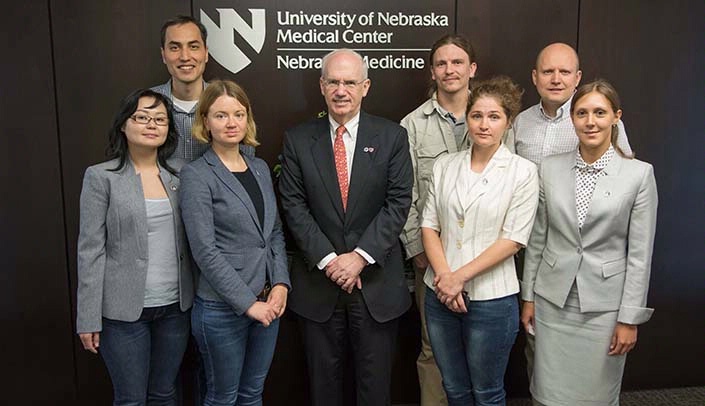Last week, participants in the Open World Program, a federal program that strives to stimulate goodwill and collaboration between the people of Russia and the United States, visited UNMC.
The seven Russian researchers, who work on mosquito- and tick-borne diseases such as Lyme disease, West Nile virus and Zika, met with various University of Nebraska experts during their weeklong visit.
Researcher Marat Makenov, Ph.D., was impressed by the collaborations at UNMC and across NU campuses.
“Frankly, I’ve never visited another university in the United States, but what I’ve seen here has impressed me greatly,” he said. “Not only with the campus and labs and how well they’re equipped, but also by the fact that talents from all over the world are here, and the university is able to integrate them all together in one collaborative effort. The range of studies they conduct is very impressive.”
Oxana Belova, Ph.D., said the research on campus surpassed her expectations.
“We’re really fascinated by all the research going on, and we met a lot of very nice colleagues,” she said.
Each delegate had opportunities to explore NU research projects in their particular area of scientific research.
“It’s a once-in-a-lifetime opportunity,” she said.
Alexander Khilkov, the delegation’s group facilitator, said the Open World program offers many avenues for collaboration.
“We bring the top Russian emerging scientists in all fields,” he said. “We have had delegations focused on cancer, molecular diagnostics and other diseases and areas. Now, this is tick-borne disease. We bring the best from Russia to introduce them to what we think is one of the best educational institutions in the United States.”
Jane Meza, Ph.D., interim associate vice chancellor for global and student support at UNMC and the University of Nebraska at Omaha (and collaboratively with Nebraska Medicine), called the program important.
“What I’ve learned from meeting with this very talented group of people is that we’re working on similar problems, so it makes a lot of sense for us to work together,” she said. “They want to work with us, and it’s a real opportunity for us to expand our reach and connections around the world. We’re talking about opportunities for some students from the U.S. to go work with our collaborators in Russia around the same kind of problems we’re working on here.”
